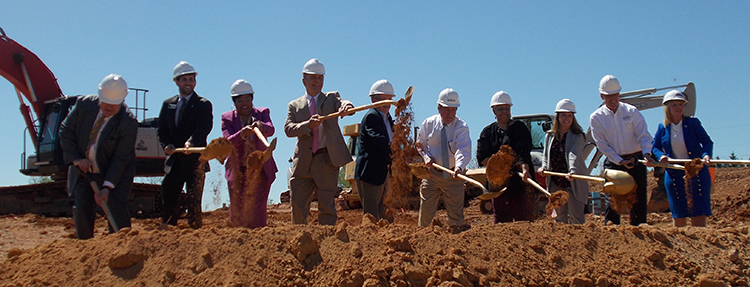
May 15. By Debbie Griffin. Affordable-housing partners gathered April 10 with golden shovels to officially commemorate the start of two projects for people 55 years and older: The 60-unit, $8.5 million Prosperity Ridge in Kannapolis and the 68-unit, $10 million Cascade Garden in Mooresville.
The non-profit organizations Wesley Community Development of Huntersville and Prosperity Unlimited of Kannapolis are key partners involved in the developments, along with Community Foundations CDC on Cascade Garden. The companies share a common mission to help people and further community.
There is an affordable and workforce housing crisis across many parts of the country. From low- and middle-income workers to retirees, the high cost of housing is affecting employers and quality of life. Completely homogenous communities are nice, sort of, but they may not provide housing options for entry-level nurses or firefighters, teachers or caregivers.
A Lake Norman Economic Development Corp. study says the average apartment runs more than $1,200 a month. According to the study, the majority of people who work in North Mecklenburg establishments earn less than $40,000. The EDC recruits businesses in Cornelius, Davidson and Huntersville.
According to the North Carolina Housing Coalition, there are 1.2 million working North Carolinians who cannot afford housing. More than 500,000 households spend one-half or more of their income on housing costs.
Collaboration is key
Joel Gilland, president of Wesley Community Development, said the projects came together because of the many community partners committed to addressing a “critical need.”
Prosperity Ridge partners included the City of Kannapolis, Cabarrus County and the Cabarrus-Iredell-Rowan HOME Consortium, administered by the City of Concord.
“The hardest thing about putting together affordable housing projects is the funding,” Gilland said at the Kannapolis event. “They know the need is there, but they’re never easy.”
HUD Field Office Director Jody Moses called the efforts complicated and remarkable, “It’s so much more than wood and paint and drywall.”
Property bought in 2003, 2007
Louise Mack, CEO of Prosperity Unlimited, said the Kannapolis project has been in the works for at least five years. Prosperity Unlimited bought roughly six acres on North Little Texas Road in 2003 for $147,000 then bought an adjacent tract of about 5.5 acres in 2007 for $123,000.
The complex will include one- and two-bedroom apartments with rent ranges between $353 and $770. The formula makes them affordable to households earning between 30% and 60% of the area median income of $35,588.
Kannapolis Mayor M. Darrell Hinnant said he’s seen Mack at work in the community for 15 years and is glad to see building begin. With dirt moving at the site, he said people have already begun calling the city for details about the property. Builders should finish construction this year, and tenancy is expected in the first quarter of 2020. Mack herself cooks the food served at meetings; eating together helped build the relationships that made Prosperity Ridge come together.
One hiccup during the long preparation is when the affordable-housing tax credits changed in value, so everything had to be refigured. Gilland credits predecessor Helm for navigating that situation.
Alliances
What it took to collect the financing was more than a dozen people bringing their expertise in affordable-housing development, lending, construction, tax credits, grants and more.
Prosperity Unlimited and Wesley Community Development provided funding information (amounts rounded).
• $4.4 million from federal
Low-Income Housing Tax
Credits
• $1.5 million from First
Mortgage
• $1.3 million from the North
Carolina Finance Agency
Integrated Supportive Housing
Program
• $425,000 from the HOME
Consortium administered by the
City of Concord
• $251,000 from Prosperity HOME
• $279,000 from Cabarrus County
HOME
• $200,000 from the Kannapolis
HOME
• $40,000 from the Kannapolis
CBDG
Mack says roughly a third of the $1.2 million in local dollars will not be paid back. There are a number of complicated options for such funds, from payback over time to

MACK
complete forgiveness.
She explains how funding for the project is divided into two parts: Construction and post-construction. It’s a “chicken-and-egg” situation because construction financing won’t come until a potential building team has lined up a purchase of the tax credits – equity financing – and a lender to provide a first mortgage.
However, equity funding and a first-mortgage lender can’t be secured until there’s an entity in place to fund construction. Mack says that the team had to apply for the mortgage loan a second time, changing the lender’s mind with a new financing structure and committed partnerships.
All the local and other funding helps control the cost of construction financing, which the permanent financing then replaces.
Affordable-housing tax credits are awarded through the North Carolina Housing Finance Agency under a competitive process. In exchange for the financing, owners agree to keep rents affordable for a period of 15 to 30 years. The Community Affordable Housing Equity Corp. (CAHEC) purchased the Kannapolis housing tax credits.
“This project is an excellent example of leveraging funding and creating an arbitrage of financing sources,” Moses says.
Created by the Tax Reform Act of 1986, the Low-Income Housing Tax Credit program gives a total to state and local LIHTC fund-allocating agencies of about $8 billion per year for relevant projects.
Two legislators recently introduced bills that propose the state offer a dollar-for-dollar match up to $2.5 million in nonrecurring funds for the 2020-2021 fiscal year.
Traffic and quality of life
At lower income levels, the problem of workforce housing is more challenging. Retail workers at $10 or $12 an hour often can’t find decent housing—driving workers away from local jobs. The gap between the lowest pay scales and housing is real.
Mooresville’s Comprehensive Housing Strategy revealed residents wanted affordable housing. Similar to Kannapolis, public and private entities formed partnerships to build the Cascade Gardens on town-owned land along Williams Street.
Unaffordable housing means qualified workers may not be able to get to work. According to the Lake Norman Economic Development study, those who commute into North Mecklenburg for work tend to be in lower-paying jobs than North Mecklenburg residents. More than 60% of North Mecklenburg residents who work elsewhere earn more than $40,000.
The inverse is true for individuals who work in North Mecklenburg but live elsewhere, where the majority (54%) earn less than $40,000. Only 45% of people who work in North Mecklenburg but live elsewhere earn at least $40,000 a year.
Transportation was mentioned most often when discussing the lack of affordable/workforce housing in the Lake Norman Economic Development study.
“Many respondents felt that if employees could live close or closer to their place of employment, then the congestion would decrease,” the study said.

Good evening, I wanted to know when they start accepting applications for jobs at this complex?
Posted by Shanrhonda Barber | November 19, 2019, 4:33 pmWhat is maximum monthly income to qualify for cascade garden apt.
Posted by Joan Powell | August 22, 2020, 8:27 am